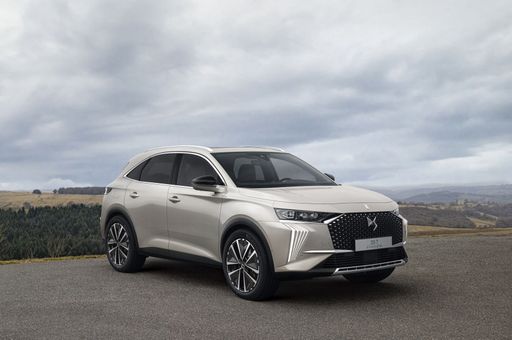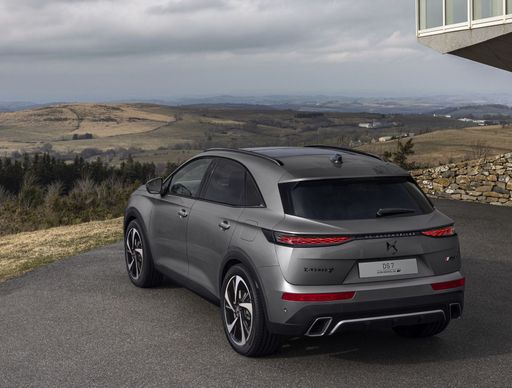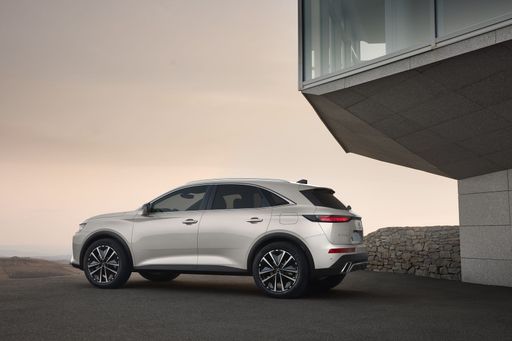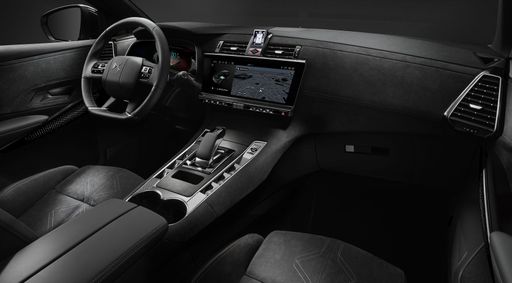When it comes to the fiercely competitive SUV market, the DS 7 Crossback and Hyundai Tucson represent two distinct philosophies in automotive design and engineering. Both vehicles are packed with features that cater to modern drivers, yet they offer unique interpretations of performance, comfort, and innovation. In this article, we will delve into a detailed comparison of these two SUVs, examining everything from their engine specifications to their technological advancements.
DS Automobiles DS 7 vs Hyundai Tucson - Differences and prices compared
Compare performance (130 HP vs 288 HP), boot space and price (41900 £ vs 20900 £ ) at a glance. Find out which car is the better choice for you – DS Automobiles DS 7 or Hyundai Tucson?
Engine Performance and Variants
The DS 7 Crossback offers a range of engine options, featuring both Diesel and Plugin Hybrid variants. Power levels range from 130 to an impressive 360 HP, with torque figures peaking at 520 Nm in the most powerful models. Acceleration is robust, with top models reaching 0-100 km/h in just 5.7 seconds and a top speed of 235 km/h.
Conversely, the Hyundai Tucson provides a wider array of powertrains including Diesel MHEV, Petrol MHEV, and full hybrid options. It has power outputs from 136 to 252 HP. The Tucson also boasts competitive performance, with acceleration times as quick as 7.9 seconds for its top variant, while its maximum speed is capped at 194 km/h.
Fuel Efficiency and Environmental Considerations
When examining fuel efficiency, the DS 7 Crossback impresses with its Plugin Hybrid versions, consuming as little as 1.3 L/100 km and achieving CO2 emissions as low as 30 g/km, clearly appealing to eco-conscious buyers. Its electric range also stands out at 65 km, promoting the possibility of all-electric driving for short commutes.
The Hyundai Tucson also performs well on this front, particularly with its full hybrid and plugin hybrid models, which achieve consumption rates as low as 1.0 L/100 km, and CO2 emissions at just 22 g/km. The Tucson stretches the electric range to an admirable 70 km, providing a practical alternative for urban drivers.
Dimensions and Comfort
In terms of dimensions, the DS 7 Crossback measures 4593 mm in length, 1891 mm in width, and 1625 mm in height. Its interior boasts a generous trunk capacity of 555 liters, comfortably accommodating family luggage or groceries.
The Hyundai Tucson is slightly smaller, with dimensions of 4510 to 4520 mm in length and 1865 mm in width. However, it offers a superior trunk capacity in certain variants, extending up to 620 liters, which may appeal to consumers needing extra storage space.
Technological Innovations
Both SUVs are equipped with cutting-edge technology. The DS 7 Crossback emphasizes luxury alongside innovation, featuring a sophisticated infotainment system, customizable ambient lighting, and an advanced head-up display that enhances driving safety. The interior is crafted with quality materials that underline its premium branding.
The Tucson, on the other hand, focuses on user-friendly technology. Its infotainment system is intuitive, featuring a crisp display and seamless smartphone integration. Advanced safety features are also integral, with Hyundai’s SmartSense technology offering a suite of driver-assist functionalities that elevate safety on the road.
Drive and Handling
On the handling front, the DS 7 Crossback is available in all-wheel-drive versions, enhancing its ability to tackle varied terrains with vehicle dynamics that provide a smooth driving experience. Its suspension system is finely tuned for comfort, making long journeys a pleasure.
Meanwhile, the Hyundai Tucson also offers both front and all-wheel-drive configurations, ensuring solid grip under a variety of conditions. Its ride quality is commendable, focusing on balancing comfort and precision handling, suitable for both urban commuting and adventurous outings.
Conclusion: Which SUV Reigns Supreme?
Choosing between the DS 7 Crossback and Hyundai Tucson ultimately boils down to personal preferences and driving needs. The DS 7 Crossback shines with its upscale interior and robust hybrid options, while the Hyundai Tucson impresses with mobility technologies and efficiency. Whether you prioritize luxury and performance or value and functionality will dictate your ultimate choice.
In a market where driver expectations continuously evolve, both of these models provide distinctive takes on modern SUV design, making them worthy competitors in any consideration.
Here’s where it gets real: The technical differences in detail
Costs and Efficiency:
Looking at overall running costs, both models reveal some interesting differences in everyday economy.
Hyundai Tucson has a convincingly advantage in terms of price – it starts at 20900 £ , while the DS Automobiles DS 7 costs 41900 £ . That’s a price difference of around 21025 £.
Fuel consumption also shows a difference: Hyundai Tucson manages with 2.70 L and is therefore decisively more efficient than the DS Automobiles DS 7 with 5.50 L. The difference is about 2.80 L per 100 km.
Engine and Performance:
Under the bonnet, it becomes clear which model is tuned for sportiness and which one takes the lead when you hit the accelerator.
When it comes to engine power, the Hyundai Tucson has a clearly edge – offering 288 HP compared to 130 HP. That’s roughly 158 HP more horsepower.
In acceleration from 0 to 100 km/h, the Hyundai Tucson is decisively quicker – completing the sprint in 7.50 s, while the DS Automobiles DS 7 takes 11.90 s. That’s about 4.40 s faster.
There’s also a difference in torque: Hyundai Tucson pulls distinct stronger with 379 Nm compared to 300 Nm. That’s about 79 Nm difference.
Space and Everyday Use:
Whether family car or daily driver – which one offers more room, flexibility and comfort?
Both vehicles offer seating for 5 people.
In curb weight, Hyundai Tucson is barely noticeable lighter – 1542 kg compared to 1651 kg. The difference is around 109 kg.
In terms of boot space, the Hyundai Tucson offers to a small extent more room – 620 L compared to 555 L. That’s a difference of about 65 L.
When it comes to payload, Hyundai Tucson noticeable takes the win – 545 kg compared to 399 kg. That’s a difference of about 146 kg.
Who wins the race in the data check?
The Hyundai Tucson holds a decisive overall lead in the objective data comparison.
This result only shows which model scores more points on paper – not which of the two cars feels right for you.
Costs and Consumption
View detailed analysis
Engine and Performance
View detailed analysis
Dimensions and Body
View detailed analysis

Hyundai Tucson
DS Automobiles DS 7
The DS 7 wraps Parisian elegance into SUV practicality, with sculpted surfaces, a jewel-like grille and an interior that feels more boutique lounge than family transporter. It appeals to buyers who want style and comfort without shouting, delivering a refined ride and clever tech that make daily driving feel a little more special — and yes, it’ll turn heads in the school run.
details



Hyundai Tucson
Hyundai Tucson marries bold, sculpted looks with a clever, roomy cabin that feels smarter than its price tag suggests. It's composed on the road, easy to live with day-to-day, and a sensible choice for buyers who want SUV style without the showroom theatrics.
details




Costs and Consumption |
|
|---|---|
|
Price
41900 - 46100 £
|
Price
20900 - 47900 £
|
|
Consumption L/100km
5.50 L
|
Consumption L/100km
2.7 - 7.6 L
|
|
Consumption kWh/100km
-
|
Consumption kWh/100km
-
|
|
Electric Range
-
|
Electric Range
63 - 70 km
|
|
Battery Capacity
-
|
Battery Capacity
-
|
|
co2
145 g/km
|
co2
62 - 172 g/km
|
|
Fuel tank capacity
-
|
Fuel tank capacity
52 - 54 L
|
Dimensions and Body |
|
|---|---|
|
Body Type
SUV
|
Body Type
SUV
|
|
Seats
5
|
Seats
5
|
|
Doors
-
|
Doors
5
|
|
Curb weight
1651 kg
|
Curb weight
1542 - 1893 kg
|
|
Trunk capacity
555 L
|
Trunk capacity
546 - 620 L
|
|
Length
-
|
Length
4525 - 4535 mm
|
|
Width
1891 mm
|
Width
1865 mm
|
|
Height
-
|
Height
1650 mm
|
|
Max trunk capacity
-
|
Max trunk capacity
1795 - 1799 L
|
|
Payload
399 kg
|
Payload
518 - 545 kg
|
Engine and Performance |
|
|---|---|
|
Engine Type
Diesel
|
Engine Type
Petrol, Full Hybrid, Plugin Hybrid, Diesel MHEV
|
|
Transmission
Automatic
|
Transmission
Manuel, Automatic
|
|
Transmission Detail
Automatic Gearbox
|
Transmission Detail
Manual Gearbox, Dual-Clutch Automatic, Automatic Gearbox
|
|
Drive Type
Front-Wheel Drive
|
Drive Type
Front-Wheel Drive, All-Wheel Drive
|
|
Power HP
130 HP
|
Power HP
136 - 288 HP
|
|
Acceleration 0-100km/h
11.90 s
|
Acceleration 0-100km/h
7.5 - 11.6 s
|
|
Max Speed
-
|
Max Speed
196 - 204 km/h
|
|
Torque
300 Nm
|
Torque
250 - 379 Nm
|
|
Number of Cylinders
4
|
Number of Cylinders
4
|
|
Power kW
96 kW
|
Power kW
100 - 212 kW
|
|
Engine capacity
1499 cm3
|
Engine capacity
1598 cm3
|
General |
|
|---|---|
|
Model Year
2025
|
Model Year
2025
|
|
CO2 Efficiency Class
E
|
CO2 Efficiency Class
F, D, E, B
|
|
Brand
DS Automobiles
|
Brand
Hyundai
|
What drive types are available for the DS Automobiles DS 7?
The DS Automobiles DS 7 is available as Front-Wheel Drive.
